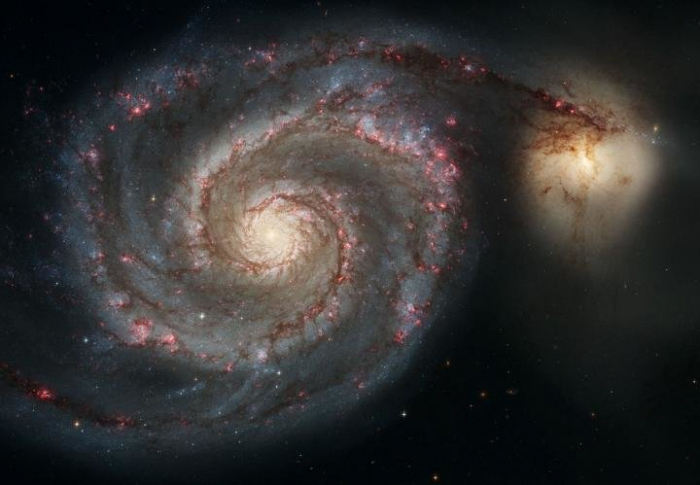The Large Magellanic Cloud could smash into our Milky Way and cause destruction throughout our galactic neighbourhood, scientists have predicted.
The huge crash could even wake up our galaxy's dormant black hole, which might swell in size by up to ten times as it eats the gas that surrounds it.
The black hole would spew out high-energy radiation into the space around it. Those cosmic fireworks are not expected to hit Earth – but there is a chance that the collision could send our Solar System hurtling through space.
But there's no need to start panicking just yet: the spectacular event is not expected to happen for another two billion years. Still, that's much sooner than the predicted crash of the Milky Way and our nearest galaxy Andromeda, which is set to happen in eight billion years.
Galaxies like our Milky Way are surrounded by a host of other smaller satellite galaxies. Those float around their hosts mostly peacefully, moving around for many billions of years.
But occasionally they move into the centre and are eaten up by their host galaxy in a dramatic collision.
The Large Magellanic Cloud is the brightest of the satellite galaxies that is floating around outside our Milky Way. It only entered the neighbourhood about 1.5 billion years ago and is relatively close to us, about 163,000 light years from the Milky Way.
Scientists thought that it would either stay orbiting around the Milky Way for billions of years, or fling itself out and away from our galaxy's gravitational pull.
But a new paper from Durham University scientists and published in the journal Monthly Notices of the Royal Astronomical Society suggests that the Large Magellanic Cloud has twice as much dark matter as we had previously thought. Since it is so massive, the satellite galaxy is quickly losing energy – meaning that it is doomed to fall into our galaxy and cause huge disruption, relatively quickly.
“While two billion years is an extremely long time compared to a human lifetime, it is a very short time on cosmic timescales," said lead author Dr Marius Cautun, a postdoctoral fellow in Durham University’s Institute for Computational Cosmology.
“The destruction of the Large Magellanic Cloud, as it is devoured by the Milky Way, will wreak havoc with our galaxy, waking up the black hole that lives at its centre and turning our galaxy into an ‘active galactic nucleus’ or quasar.
“This phenomenon will generate powerful jets of high energy radiation emanating from just outside the black hole. While this will not affect our Solar System, there is a small chance that we might not escape unscathed from the collision between the two galaxies which could knock us out of the Milky Way and into interstellar space.”
The Independent
More about: solarsystem
















































